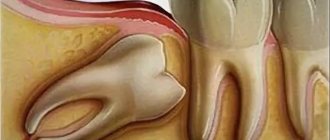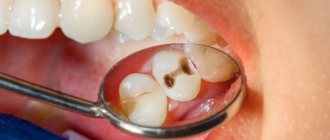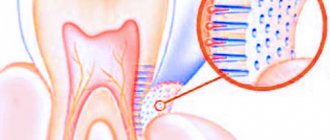What is anesthesia?
The procedure for injecting special drugs aimed at eliminating local sensitivity is called anesthesia. The active substance of the anesthetic blocks the conduction of impulses from nerve endings to the brain, preventing the occurrence of pain in response to manipulations. After the anesthetic wears off, sensitivity is completely restored.
Today in dentistry there are several types of local anesthesia. The most commonly used anesthesia is an injection into the area of one tooth. Other methods are aimed at “switching off” the nerves of several teeth at once.
The anesthesia procedure allows you to avoid discomfort during dental procedures, which is why anesthesia is used everywhere during the treatment and extraction of teeth.
Case histories
Question answer
In what cases should patients be given pain medication? “For 12 years I was tormented by pain in my hip, in the last 2 years it has intensified, nothing helped, I could hardly walk,” says a man in his sixties, walking along the corridor of the department. — The Ministry of Health gave me a referral to the Research Institute of Neurosurgery. First they put in a temporary neurostimulator, and I immediately felt better. The pressure dropped to normal, before it was 180/120. The pain has eased significantly. Now the stimulator is constant, I turn it on when necessary. I take medications much less often.”
In addition to pain, the method can also help with delicate problems. “Three years ago I was diagnosed with an overactive bladder,” says the young woman. — Every 30-40 minutes I had to go to the toilet. I couldn’t leave home for a long time, I couldn’t go to the movies, and riding public transport was a problem. I tried everything - medications, homeopathy, acupuncture, psychotherapy - nothing helped. A year ago they installed a stimulator and life got better.”
Reasons for the lack of effect of anesthesia
- Individual features of anatomy. The effect of the local anesthetic is ensured by its injection into a specific location near the nerves. However, there are people who have a non-standard structure and arrangement of nerves. In such situations, additional injections of anesthetic solution are required in other areas.
- Local inflammatory process. In the presence of infectious inflammation in the tissues, the pH level decreases, which indicates an increase in the acidity of the environment. Under such conditions, the chemical structure of anesthetics is destroyed and their effect is neutralized. There are several solutions to this problem: preliminary therapy with antibacterial drugs or the use of alternative methods of pain relief that do not affect the area of inflammation (Gow-Gates anesthesia, intraosseous anesthesia, etc.).
- Ehlers-Danlos syndrome. This is a genetic disease that affects the condition of the skin, bone tissue and muscles. With this pathology, conventional anesthesia is not effective, and it is necessary to resort to the use of stronger drugs. In some cases, for high-quality pain relief, several injections are required at once.
- Psychological state of the patient. With dental phobia (panic fear of dental treatment), the production of anxiety hormones that interfere with the action of anesthetics increases. People with this condition are advised to take sedatives before visiting the dentist.
- Red hair color. It is known that red hair is a consequence of a mutation in the melanocortin-1 gene, a change in which also reduces the effectiveness of local anesthesia.
- Poor quality anesthetic. If the storage rules for the drug are not followed and its expiration date expires, you may not expect any effect from the administration of the anesthetic. Therefore, you should be responsible when choosing a doctor and a clinic where treatment will be carried out.
- Insufficient amount of administered drug. If the dosage is incorrectly selected, the anesthetic will not be able to work effectively.
- Wrong choice of drug for pain relief. The anesthetic should be selected by the dentist depending on the method of anesthesia and the desired result.
- Violation of the integrity of the mucous membrane at the site of injection of the anesthetic. The solution will simply flow out of the tissue without having the desired effect. This can happen if you select an injection needle incorrectly, which will injure the mucous membrane, forming a wide channel behind it.
If pain relief is repeatedly unsuccessful during treatment or tooth extraction, the dentist will be able to determine the cause of the problem and select an alternative method of anesthesia.
Why is it so important to follow WHO recommendations and principles?
Thus, WHO provides basic principles and recommendations for a smooth transition from step to step, which help to avoid a dead end in therapy - when the pain intensifies, and there are no longer any means to combat it.
This happens if the oncologist prescribes opioid medications ahead of time or at a dose greater than necessary. If you jump from ketorol to promedol (as, unfortunately, some doctors do - some due to inexperience, some due to lack of the necessary drugs), then at first the effect may exceed expectations. But then it turns out that the pain will begin to require an increase in dosage faster than prescribed by the safe regimen. The steps will end before you complete the required number of steps. In this case, the doctor himself takes away the means of treatment.
From the patient’s side, the main thing is huge! — a mistake is “to endure until the last.” This is especially noticeable in Russian patients. When people from the Baltic states come to us for treatment, for example, they no longer have this extra partisan “heroism”.
And it’s right to tell your doctor about pain right away. Because in the treatment of pain there is one unpleasant paradox: the longer you endure, the more difficult it is to get rid of the pain. The fact is that long-term pain means prolonged and persistent excitation of the same nerve pathways. Nociogenic nerve cells, say, “get used” to conducting pain impulses and their sensitization occurs—an increase in sensitivity. In the future, they easily respond with a pain response even to weak and harmless influences. Such pain becomes much more difficult to cope with.
Recommendations before visiting the dentist:
- The night before your appointment, drink lemon balm or chamomile tea before bed. These natural remedies have excellent calming effects.
- If you have constant strong feelings, before each dentist appointment, it is recommended to take a course of light sedatives a week before visiting the doctor. For example, “Afobazol” and “Tenoten”, they calm the nervous system, improving well-being and relieving anxiety before dental surgery. Drugs such as valerian and motherwort are best taken in tablets: tinctures are alcohol-based, which impairs the quality of pain relief.
- For the same reason, you should not drink alcoholic beverages at least 24 hours before your dentist appointment. Alcohol is eliminated from the body within 72 hours, but the products of its metabolism remain in the body for another week. To speed up the cleansing of the body from toxic substances, it is recommended to take sorbent preparations.
- Get a good night's sleep and eat before your appointment. This way you will save yourself from additional stress, and, consequently, from unnecessary problems during dental procedures.
- Be sure to tell your dentist about any medical conditions you have and the medications you are taking! This will help the doctor choose the right method of pain relief and anesthetic. In addition, taking certain medications can greatly reduce the quality of pain relief.
The main recommendation would be a careful approach to choosing a dental clinic and doctor. After all, a competent dentist, even if difficulties arise with administering anesthesia, will be able to find the right way out of the current situation.
The tests are normal, but the pain does not go away. What are the dangers of long-term stress?
I woke up and can't sleep.
Symptoms of Chronic Stress
Anxiety disorders have been known since the time of Hippocrates. Even then, people were mentioned who suddenly felt afraid on a deserted road far from home, who were afraid of cats, etc. The effect of stress on the body began to be studied in detail only in the middle of the 20th century. In some cases, short-term stress (and it can even be a pleasant event) is useful, but chronic nervous tension negatively affects not only a person’s psychological state, but also physical well-being.
Olga Litvinovich:
“A business meeting at work, speaking in front of a large audience, the desire for perfectionism both in business and at home, social upheavals... Any event can become stressful for a person. Someone may reflect that, for example, anxiety and headache appeared after a certain incident. Another person will ignore these thoughts and brush them aside. When we are in a state of prolonged chronic stress and tension, the body begins to signal that it is overloaded and exhausted.” What signs indicate nervous overload?
- insomnia. Including sleep disorders, when a person wakes up around 3 a.m. and cannot fall asleep; - inability to concentrate; - loss of interest in what used to bring joy; - feeling of constant vague anxiety; — pressure surges; - psychogenic pain of various localization (migraine, abdominal pain, etc.).
Olga Litvinovich:
“Accumulated anxiety and stress can become somatized and manifest themselves in the form of a specific pain sensation. It can occur on any part of the body. Some suffer only occasionally, while others suffer from constant pain for months or even years. Moreover, it cannot be measured. We ask the patient to rate the pain themselves on a scale from 0 to 10. Of course, this is subjective and depends on the person's pain threshold and other factors. If the prescribed examinations do not reveal pathologies, then there is a high probability that the pain is psychogenic. In this case, the treatment should be radically different. Conventional painkillers will not have any effect. This requires the prescription of antidepressants (by the way, they can also be prescribed by a neurologist), psychotherapy and lifestyle correction are also desirable. Fortunately, now people, especially young people, do not hesitate to turn to psychologists and psychotherapists. In cases of unclear anxiety and fear, as a rule, people come for psychological help themselves. People with pain most often go to a therapist. And after going through many examinations, they end up seeing a neurologist. Treatment with antidepressants helps adjust pain centers and improve the functioning of neurotransmitters. You need to take antidepressants for a long time, several months. The effect occurs in 2-3 weeks. Modern treatment protocols are safe and do not cause addiction or weight gain.” Pain from... painkillers
There is a category of patients who harm themselves with their own forethought. For example, they take painkillers “just in case,” even when nothing hurts.
Olga Litvinovich:
“Most often women are guilty of this. Knowing that they have headaches, for example, they take pills so as not to “spoil their day.” This behavior is dangerous. Uncontrolled use of painkillers (for 15 days or more) can itself cause pain. It turns out to be a vicious circle.” How else is self-medication dangerous?
— the gastrointestinal tract suffers from the abuse of painkillers.
This threatens the occurrence of gastritis, ulcers, gastrointestinal bleeding; - Alcohol-based sedatives can be addictive like drugs. Psychogenic pain.
Is a doctor required? If at first you can cope with psychogenic pain on your own by adjusting your lifestyle, then chronic pain will not go away without the help of a specialist.
Olga Litvinovich:
“If the pain lasts longer than 3 months, it is considered chronic. If pain persists for more than one year, then even with treatment, the effectiveness of medical care decreases. After 5 years of living with psychogenic pain, it is almost impossible to cope with it, even with medication. You should understand that you need to get ready not only to take pills, but also to completely change your lifestyle and master the skill of mental hygiene.” What is important in the treatment of psychogenic pain (and for its prevention)?
— establish proper sleep; - eat a balanced diet; - move. And don’t force yourself to go to workouts you hate, but do what you really like; - be in the fresh air. At least a half-hour walk every day will help relieve accumulated tension and improve your psychological state; - shift focus to positive aspects. Sometimes this is difficult to do, but the brain must be consciously switched to searching for the good. In the USA, they even created a special radio for these purposes, where only good news is told; — limit the flow of negative messages. When a person reads or watches something bad on video, the psyche works in such a way that he begins to try the situation on himself, thereby exposing the body to additional stress; - protect yourself from a toxic environment; - seek help from specialists. It is impossible to thoroughly understand everything. Sometimes the situation seems hopeless, but for a professional it can be an understandable case that can be easily dealt with instead of suffering from insomnia or pain for years.
Focusing on the positive and taking time for yourself and your condition is not selfish. Only a fulfilled person can communicate productively in society and be useful to others. Sometimes medical attention is needed to help the body cope with stress. In case of increased anxiety and psychogenic pain, the timeliness of seeking it plays a significant role.











